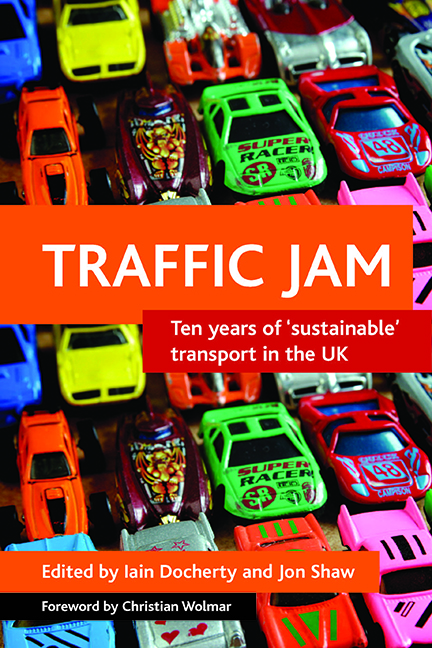Book contents
- Frontmatter
- Dedication
- Contents
- List of tables, figures and boxes
- Foreword
- Preface and acknowledgements
- List of acronyms
- Notes on contributors
- Part One Policy and politics
- Part Two Progress in policy implementation
- Part Three Ten years since A new deal for transport – signposts to the UK’s transport future?
- Index
ten - Mind the gap! The UK’s record in European perspective
Published online by Cambridge University Press: 21 January 2022
- Frontmatter
- Dedication
- Contents
- List of tables, figures and boxes
- Foreword
- Preface and acknowledgements
- List of acronyms
- Notes on contributors
- Part One Policy and politics
- Part Two Progress in policy implementation
- Part Three Ten years since A new deal for transport – signposts to the UK’s transport future?
- Index
Summary
The purpose of this chapter is to consider the changes in transport ‘on the ground’ in the 10 years since A new deal for transport (DETR, 1998), in comparison with what other European countries have achieved. In other words, at the local and national scales, what real changes to transport have there been that people notice and hence that influence their travel behaviour? How far have policy objectives such as reduced congestion and cardon dioxide (CO2) emissions been achieved? In answering such questions, the chapter marshals a range of evidence. It first outlines factors that are widely considered capable of promoting travel behaviour change, before discussing recent transport developments at the local level in the UK using an analysis of a sample of English Local Transport Plans (LTPs). These are compared with equivalent jurisdictions in mainland Europe. Discussion then turns to comparing the UK's transport progress with that elsewhere in Europe at the national level. On these bases it is possible to comment on the extent to which the UK has in any way ‘closed the gap’ in transport provision with its main northern and western European counterparts; the Commission for Integrated Transport (CfIT) found in 2001 that as a proportion of Gross Domestic Product (GDP) Britain had been spending 40% less than its competitor countries on transport infrastructure for 40 years (CfIT, 2001; Docherty, 2004; see also the Preface and acknowledgements).
A key challenge in writing this chapter has been obtaining reliable comparative data. Even within the UK, this is a problem: discussion of changes at the local level concentrates mainly on changes in England because of the much greater availability of monitoring data compared with Scotland, Wales and Northern Ireland. European comparisons are even more difficult given that the different territorial scale at which many transport schemes are delivered means that there is no consistent country-by-country summary of what has been achieved. Thus, it has been necessary instead to use a variety of sources, from DG TREN statistics, through national statistics and annual reports of organisations such as Netherlands Railways to Spanish mobility observatories, site visits and personal communications with local and regional authorities.
The CfIT Study of European best practice in the delivery of integrated transport (CfIT, 2001) is also a valuable source of data. A follow-up report was published by CfIT in 2007.
- Type
- Chapter
- Information
- Traffic JamTen Years of 'Sustainable' Transport in the UK, pp. 205 - 230Publisher: Bristol University PressPrint publication year: 2008



